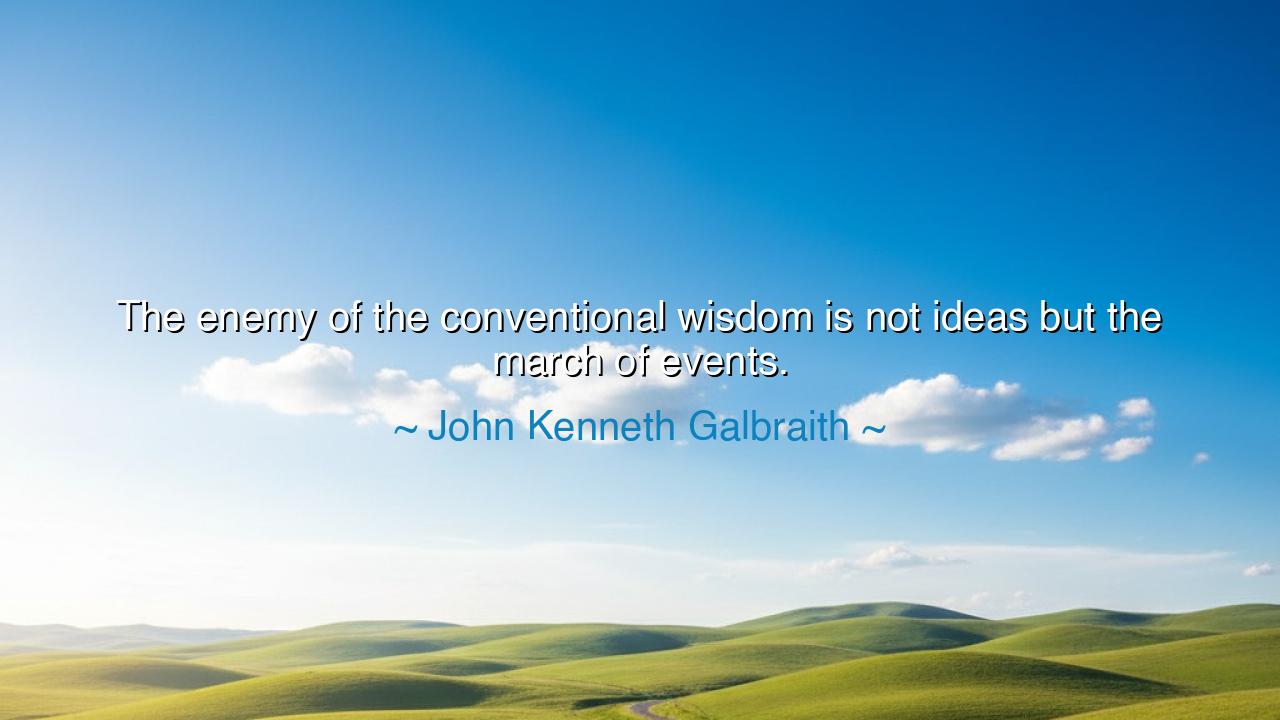
The enemy of the conventional wisdom is not ideas but the march






The economist and sage John Kenneth Galbraith spoke with the voice of foresight when he declared: “The enemy of the conventional wisdom is not ideas but the march of events.” In these words lies a truth that humbles the proud and unsettles the comfortable: that no fortress of thought, no doctrine of the wise, can stand unchallenged before the relentless tide of events. For the world is not frozen in place; it is ever moving, ever unfolding, and in its march, it crushes the idols of yesterday’s certainty.
The origin of this saying lies in Galbraith’s reflections on economics and society. He saw that conventional wisdom—the beliefs most people hold to be obvious and eternal—often endures against fresh ideas, resisting innovation or challenge. But when history itself rises with famine, war, crisis, or change, no argument can shield false certainties from collapse. The flood of reality sweeps away the sandcastles of complacency, leaving only those truths that can endure.
History bears witness in the story of the Great Depression. For years, the conventional wisdom of unregulated markets and boundless prosperity reigned unshaken. Critics offered new ideas, but they were dismissed by those enthralled by wealth. Then came the crash of 1929, the banks collapsing, the breadlines lengthening. It was not debate but the march of events that toppled the old order and forced nations to reimagine their economies. Thus Galbraith’s words stand proven: it is reality itself that shatters illusions.
The ancients, too, knew this truth. The Trojans believed their walls invincible, their city eternal, until the events of war and the cunning of a wooden horse revealed their folly. The Romans trusted their empire to stand forever, yet barbarian invasions and corruption brought it low. Time and again, human beings cling to conventional wisdom, but the march of events is the true teacher, sharp and merciless.
Therefore, O seekers of tomorrow, do not cling blindly to the wisdom of the moment, however secure it may seem. Be watchful, for events move ever forward, and no belief is beyond their trial. The wise man does not resist reality but adapts to it, bending like the reed that survives the storm while the rigid oak is broken. For it is not ideas alone, but the unfolding of life itself, that tests our truths. Let this be your lesson: walk humbly, live watchfully, and learn always from the march of events.






BHTa Nu Bich Hue
Galbraith’s quote captures the fragile nature of what we call wisdom. It suggests that time and events, not innovation or theory, are what truly reshape what we believe to be true. I think that’s both humbling and hopeful. But it also raises a question—does this mean that every form of wisdom has an expiration date? How can we distinguish between enduring truths and those that are merely convenient until the next big shift happens?
TNThu Nguyen
This statement by Galbraith feels almost prophetic. It’s as if he’s saying that change doesn’t come from intellectual debate, but from the unavoidable march of time and circumstance. That makes me wonder—how should leaders or thinkers prepare for that inevitability? Can conventional wisdom ever be truly ‘future-proof,’ or will it always be a temporary framework waiting to be replaced by new realities?
BMB Moi
I find Galbraith’s insight compelling—it reminds me that events, not arguments, are what truly transform society. It’s not necessarily new ideas that challenge what we think we know, but the undeniable facts that arise in the world around us. It makes me wonder, though, do we tend to ignore reality until it forces us to change? Why do people cling to outdated beliefs even when events clearly prove them wrong?
NHNguyen Nhan Nguyen ha
This quote makes me think about how history has repeatedly proven that accepted truths can crumble when the world changes. What we once believed to be unshakable wisdom often becomes outdated when circumstances shift. But that raises a question: are we too attached to conventional wisdom because it provides comfort and stability? How do we train ourselves to adapt and recognize when reality is outpacing our beliefs?
THLan Anh_9C_2007 Trieu Hoang
Galbraith’s observation feels incredibly relevant even today. It suggests that no matter how strong or accepted an idea might be, reality itself has the power to challenge and overturn it. I think that’s fascinating—and a bit unsettling. Does this mean that conventional wisdom is always doomed to fail eventually? Or is it possible for ideas to evolve fast enough to keep pace with the unfolding of new events and realities?